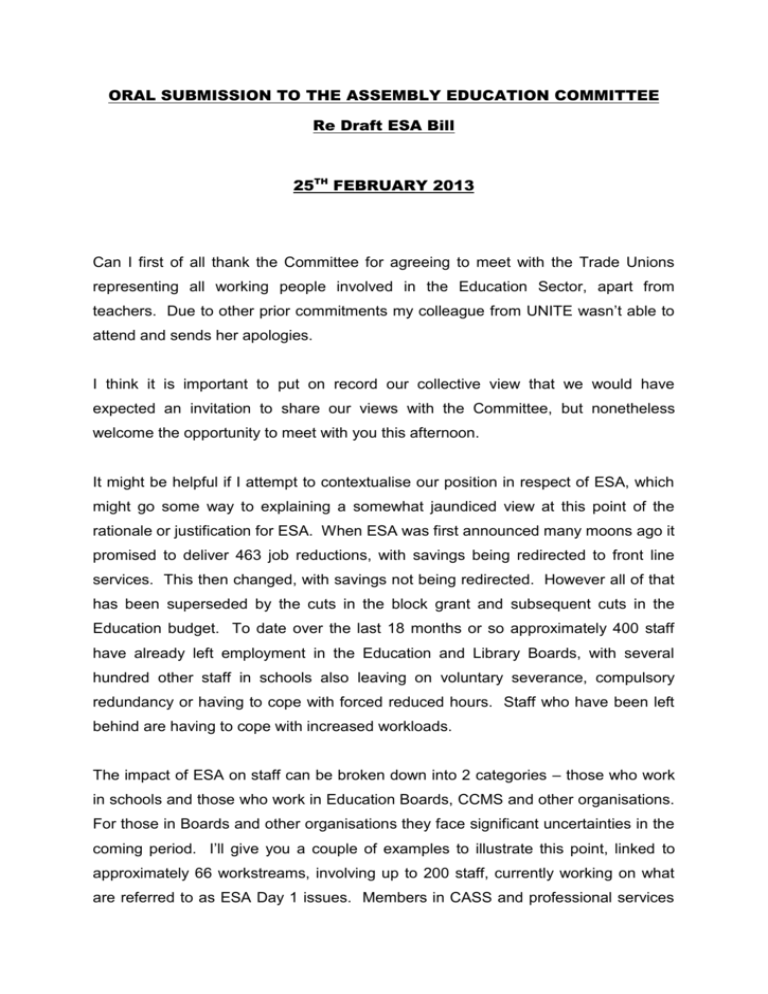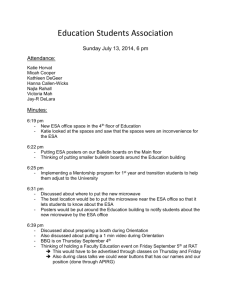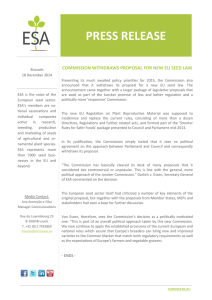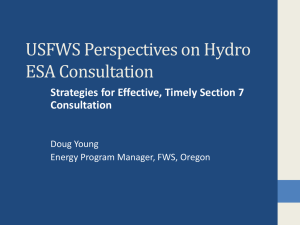Northern Ireland Public Service Alliance 2
advertisement

ORAL SUBMISSION TO THE ASSEMBLY EDUCATION COMMITTEE Re Draft ESA Bill 25TH FEBRUARY 2013 Can I first of all thank the Committee for agreeing to meet with the Trade Unions representing all working people involved in the Education Sector, apart from teachers. Due to other prior commitments my colleague from UNITE wasn’t able to attend and sends her apologies. I think it is important to put on record our collective view that we would have expected an invitation to share our views with the Committee, but nonetheless welcome the opportunity to meet with you this afternoon. It might be helpful if I attempt to contextualise our position in respect of ESA, which might go some way to explaining a somewhat jaundiced view at this point of the rationale or justification for ESA. When ESA was first announced many moons ago it promised to deliver 463 job reductions, with savings being redirected to front line services. This then changed, with savings not being redirected. However all of that has been superseded by the cuts in the block grant and subsequent cuts in the Education budget. To date over the last 18 months or so approximately 400 staff have already left employment in the Education and Library Boards, with several hundred other staff in schools also leaving on voluntary severance, compulsory redundancy or having to cope with forced reduced hours. Staff who have been left behind are having to cope with increased workloads. The impact of ESA on staff can be broken down into 2 categories – those who work in schools and those who work in Education Boards, CCMS and other organisations. For those in Boards and other organisations they face significant uncertainties in the coming period. I’ll give you a couple of examples to illustrate this point, linked to approximately 66 workstreams, involving up to 200 staff, currently working on what are referred to as ESA Day 1 issues. Members in CASS and professional services have lost about 100 staff in the last 12 months. A new model apparently has been or is being developed, yet Trade Union Side has yet to have sight of it. This Education Committee has been advised by Departmental Officials that this new model will be linked to a “mixed market”. We have no clarity either on what this will mean or how much it will cost schools to “buy in” these services. A further example is the decision taken recently by the Department to transfer, when ESA is established, the procurement arrangements for goods and services from the Education Boards and others to CPD in DFP. Quite apart from the complete lack of consultation, not to mention the lack of detail on the potential impact on staff, it doesn’t appear that there has been any economic analysis on the very likely impact there will be on small local businesses in local communities who rely on the local procurement arrangements to sustain those businesses and their livelihoods. There is a very real risk that many small businesses will go to the wall as a result of this procurement decision, which seems to have been made without proper consultation with anyone. For school based staff one of the major issues for them is clearly the lack of clarity around who will be the employer – the debate as you know is around the difference between being the “employer” versus the “employing authority” – Clause 3 and other clauses in the draft Bill refer. It is our view that the drafting of this Bill is deliberately ambiguous to get everyone over the line. However it is that ambiguity which most concerns the Unions. We have a genuine fear that the Bill is drafted in such a way which will intentionally or otherwise facilitate 1200 schools, each becoming their own stand alone employer, with the power to determine their own terms and conditions of employment for staff, including pay, grading, other terms and conditions, disciplinary procedures, other policies and procedures and pensions provision and potentially enable Boards of Governors to ignore negotiated agreed policies and procedures, which already meet recognised high standards. Despite some attempted assurances from the Minister, Departmental Officials and others we remain concerned that this is a very real possibility, not because of their insincerity, but rather because the Bill has been drafted in such a way, intentionally or otherwise, to facilitate this outcome. To illustrate this I would like to refer the Committee to a number of contributions made by Chris Stewart to this Committee over the last number of months. On 21st November 2012 Chris submitted, without prompting, or without being under pressure to think on his feet in response to a particular question, he openly stated: “However, that clause (reference to Clause 43), along with the new definition that it brings and some other changes in the schedule of amendments, fundamentally changes the position of controlled schools in the education system. In essence, they will no longer be controlled in any real sense.” On 6 February 2012 in response to the Chairperson in respect of a question in relation to Clause 2, Chris Stewart indicated: “The changes in the Bill mean that controlled schools will be in a very different position. They will still be owned by ESA, but they will be managed by their board of governors.” Most tellingly of all perhaps is Chris Stewart’s response on 30 January 2013 to a question from Trevor Lunn about a view expressed by the Voluntary Grammar sector. Chris actually confirms our fears when he stated: “It says very clearly that a controlled school is one that is under the control and management of its board of governors. That is a huge change: a controlled school today is under the control and management of an education and library board. All the things that you hear controlled sector colleagues say last week that they found difficult and challenging stem from those management arrangements. So, the need to adopt a standard job description or set of terms and conditions comes from the fact that that is what their education and library board says. Any restriction on employing a bursar or any other type of staff stems from the fact that that is what their education and library board says. If the Bill becomes law, those will be decisions for the boards of governors. If they want to take a standard job description from ESA, they are, of course, at liberty to do so, and if they want to draw up their own, they are at liberty to do so.” (In the subsequent discussions with the Committee after my oral submission it was clarified that the Unions’ concern in respect of the powers given to the Board of Governors by this draft Bill extended significantly further than merely having the ability to determine their own staffing levels. The clarification provided by Chris Stewart to this Education Committee demonstrates that Boards of Governors in every school will have the power, if they so chose, to determine not just the numbers of staff employed, but also the grading of those staff, the pay levels, the pension arrangements, the job descriptions for their staff and the policies and procedures to be used for their school. Trade Union Side pointed out that Voluntary Grammar Schools currently have all of these powers and this draft Bill is written in such a way, in our view, to bring that group into ESA, but by doing so not only enables these schools to continue with those practices, but by extension, enables all other schools to do likewise. Trade Union Side indicated that they view as sleep walking into chaos and would be detrimental to good industrial relations, would likely introduce bad work practices and also create divisions where they didn’t currently exist.) If this Bill actually facilitates what Chris has outlined this will be a recipe for disaster. The Bill will result in 1200 schools or 1200 boards of governors, all having the individual power to decide their own arrangements, grading, pay, employment schemes, recruitment practices, disciplinary arrangements and other policy and procedures. The only powers which ESA as an organisation appear to retain seem to be extremely limited for example, as in Clause 9(3) which refers to Boards of Governors being required to “consider that matter” in reference to an issue raised by ESA. Most worryingly of all however is Clause 5(4) which states that “ESA will approve without modification a (employment) scheme submitted to it under subsections (1)(b) unless ESA determines that the scheme does not comply with the statutory requirements” ie not for any other reason, so as long as a scheme complies with the statutory requirements then ESA must approve it without modification. This point is also reiterated in Clause 7(2). On matters of suspension or dismissal the draft Bill in Schedule 2 merely gives ESA a right “to be notified”, or a right “to attend board of governors meetings” where this relates to dismissal – this seems extremely limited powers for ESA if it is indeed supposed to be the actual employer. In addition Clause 12 enables voluntary grammar schools to make their own payments to staff. So instead of being automatically included in ESA for staff wages, allowances and contributions the assumption is that they will remain outside the tent. And to date being outside the tent has meant different terms and conditions for our members. If ESA is the employer as stated in Clause 3(1) there is clearly a contradiction here. In respect of the Tribunal referred to in Clause 62 (and other sections) there is a total lack of clarity about the functions, arrangements for appointment, remit of the Tribunal, who has access to it and who sits on it. Trade Union Side would contend that there needs to be clarity around all of this. There also needs to be meaningful consultation with the Unions around the draft model Schemes of Employment and draft model Schemes of Management and in relation to the ability of Trade Unions or others to refer issues to the Tribunal if agreement cannot be reached. Linked to this point, if model employment or management schemes are agreed it should be the case that all schools should be expected to adopt these without amendment, unless they can demonstrate a very robust argument for not doing so. With regard to the TUPE protection for staff we have some concerns that the wording in Schedule 3(4) is not sufficiently clear. We will be pursuing this matter with Officials so that we have something on record that confirms that our members’ terms and conditions will be fully protected if ESA is established. It is particularly telling that in Clause 28 there is reference to just about everyone under the heading of “Involvement of Relevant Interests”, everyone that is, bar staff representatives or Trade Unions. This should be rectified in the redrafting stage. In Schedule 1 of the draft Bill, Trade Union Side would argue strongly that there should be at least 1, if not 2 representatives from the Unions (nominated through Congress) on the ESA Board. With representatives across the teaching and academic support sectors, the Trade Union movement has significant experience of educational issues and would make both a positive and valuable contribution to the workings of the ESA Board. We would be more than happy to take any questions or answer any queries you may have on this submission, the NIPSA response or any other issue you may have.





